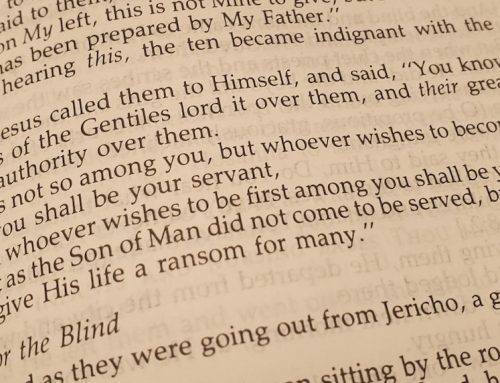
With that, let’s put aside the traditions of men and take a look at what the Bible really says about alcohol.
If you’re a Christian, you may be surprised to know that the Bible doesn’t make a blanket condemnation of alcohol. Instead, the Bible’s teaching on it is consistently one of moderation, not prohibition. Both the Old and New Testaments actually come right out and authorize drinking alcoholic drinks.
This passage from the Old Law actually has Moses authorizing the purchase of alcohol for a celebration using the family’s tithe money:
Deuteronomy 14:25-26 – then exchange your tithe for silver, and take the silver with you and go to the place the LORD your God will choose. 26 Use the silver to buy whatever you like: cattle, sheep, wine or other fermented drink, or anything you wish. Then you and your household shall eat there in the presence of the LORD your God and rejoice.
One of the blessings Solomon tells us that God promised to Israel if they were faithful was vats overflowing with wine. I don’t think he’d bless them with something he thought was inherently evil:
Proverbs 3:9-10 – Honor the LORD with your wealth, with the firstfruits of all your crops; 10 then your barns will be filled to overflowing, and your vats will brim over with new wine.
And remember, God is the same yesterday, today, and forever. So when Solomon, the same author who wrote about the blessing of vats overflowing with wine, goes on to advise us about the dangers of alcohol, we know he’s not prohibiting it. He’s clearly giving advice about the dangers of indulging in too much of it:
Proverbs 20:1 – Wine is a mocker, strong drink is raging: and whosoever is deceived thereby is not wise.
I’ll be giving my kids the same advice. Don’t be deceived by it. Alcohol can be a real temptation for some people. Drinking too much of it even once can cause you to do things you may regret for the rest of your life. But I’d rather have my kids, who are all believers, know the truth–that the Bible doesn’t prohibit it–than propagate a lie and tell them that it does. In fact, I will be honored if I’m the one they have their first glass of wine with.
Moving on to the New Testament, the Bible continues the theme of moderation. Perhaps the strongest evidence that wine is not prohibited is that Jesus himself made it as his first miracle in John 2:1-11. It is ludicrous to think the Son of God would set such a poor example for all of mankind by making alcohol (and a large quantity of it) if it were a sin to drink it, purchase it, or to be seen at the same table with those who were drinking it.
If Jesus making wine wasn’t a clear enough indication of its acceptance, did you know that Jesus himself actually drank it? Yes, that’s right; but you probably never heard that in Bible class.
Luke 7:33-34 – For John the Baptist came neither eating bread nor drinking wine, and you say, ‘He has a demon.’ 34 The Son of Man came eating and drinking, and you say, ‘Here is a glutton and a drunkard, a friend of tax collectors and “sinners.”‘
Jesus is contrasting the Pharisee’s view of John the Baptist with their view of himself. He said that John did not eat bread or drink wine and was condemned by the Pharisees, yet Jesus came both eating and drinking and was condemned for being a glutton, a drunk, and a friend of sinners. So he obviously drank alcohol, and with low-life sinners no less.
I guess that completely removes the “appearance of evil” card from the deck (although that phrase is completely misunderstood).
As if that weren’t clear enough, we know that wine (no, not Welch’s 100% Grape Juice) was used in the Lord’s Supper in the first century. If you really believe we have to follow all first century church practices, then we are not only allowed to use it in the Lord’s Supper, but we must!
1 Corinthians 11:20-21-When you come together, it is not the Lord’s Supper you eat, for as you eat, each of you goes ahead without waiting for anybody else. One remains hungry, another gets drunk.
Read the whole passage on the Lord’s Supper from verse 17 to the end. He corrects them for several things, not one of them being their use of fermented grape juice. And lest you say that they didn’t have the technology to preserve grape juice without it being fermented, this isn’t true–at least not when grapes were in season. Nevertheless, the church routinely dismisses historical sources in developing doctrine, so this shouldn’t matter. The Bible says they did it, it has to be OK.
This is an enlightening Scripture:
Ephesians 5:18 – And be not drunk with wine, wherein is excess; but be filled with the Spirit.
Excess means going beyond what is necessary, permitted, or desirable. You can’t get to “excess” without first going through the line of “moderation.” He is obviously addressing a lack of self control. Paul wasn’t telling Christians to be teetotalers, but to be moderate if they chose to drink alcohol. To remove choice is teaching for doctrines the commandments of men.
Moving on, deacons (wait, the church doesn’t have deacons or elders?) are told here to not indulge in much wine, clearly implying that wine in moderation is okay:
1 Timothy 3:8 – Deacons, likewise, are to be men worthy of respect, sincere, not indulging in much wine, and not pursuing dishonest gain.
In the same letter, Paul wrote to Timothy (who was a young man), to stop drinking water, and use a little wine for his stomach problems:
1 Timothy 5:23 – Stop drinking only water, and use a little wine because of your stomach and your frequent illnesses.
Paul tells Titus to teach older women to be reverent and to not be addicted to much wine:
Titus 2:3 – Likewise, teach the older women to be reverent in the way they live, not to be slanderers or addicted to much wine, but to teach what is good.
We can’t just decide to make rules that aren’t in the Bible. Paul clearly implies that an elderly woman can be reverent and still have a glass of wine in her hand, yet you wouldn’t know that by attending a wedding with those in the church who put their own man-made laws ahead of the Bible and teach that wine is a sin.
There are a couple of verses I should address that are frequently used to suggest that wine is wrong. One is in Romans:
Romans 14:21 – It is better not to eat meat or drink wine or to do anything else that will cause your brother to fall.
But the context of Romans 14 is a discussion of Christians who have opposing views about whether it’s okay to eat meat or keep holidays. In that chapter, he doesn’t say that it’s necessary to decide one way or the other. He says that the correct question to answer is “what is the loving thing to do?”
So if grilling a good steak could cause a young Christian to sin because of his strong belief in vegetarianism, I should abstain from that steak. Of course, he doesn’t have to know I’m enjoying a fine steak without him on Friday night with my family, nor is it an “appearance of evil” to go to the grocery store to buy a succulent cut of beef to throw on the grill for dinner.
On the other hand, if I know that steaks are not a sin to eat, but continue to teach that we should not eat them, then I’m now “teaching for doctrines the commandments of men.” It’s wrong to falsely teach that eating steak is sinful, when in fact it is not, just as it’s wrong to falsely teach that drinking wine is sinful, when in fact it’s not.
The other verse frequently used for this subject is the one about abstaining from the appearance of evil:
1 Thessalonians 5:22 – Abstain from all appearance of evil.
The answer to this one is pretty simple. The Bible never suggests wine, or drinking wine, is evil, so who are you, a mere human, to say it is? Certainly Jesus, Paul, and Moses never taught that. Excess is what is evil, not moderation. We have no authority in scripture to go beyond that.
I’ll leave you with the words of Paul on the value (or lack thereof) of dietary regulations for Christians:
Colossians 2:20-21 – Since you died with Christ to the elemental spiritual forces of this world, why, as though you still belonged to the world, do you submit to its rules: “Do not handle! Do not taste! Do not touch!”? These rules, which have to do with things that are all destined to perish with use, are based on merely human commands and teachings. Such regulations indeed have an appearance of wisdom, with their self-imposed worship, their false humility and their harsh treatment of the body, but they lack any value in restraining sensual indulgence.
Hard to argue with Paul, isn’t it?






Kevin, you are taking away a strong foundation that many people stand on, what do you have to replace it? You need to put something underneath before you continue your demolition of the other.
Dear Anonymous, you are starting with the assumption that this faction which started back in the late 60's or early 70's is a "strong foundation," and I think it is easily shown that isn't true. It is a weak foundation for one's faith; a house of cards built by men using layer upon layer of doctrines and traditions and judgments of men. Our foundation should never be in organizations or movements of men, and that's true whether we're talking about the Reformation, the Restoration Movement of Campbell and Stone, or the nominal Church of Christ as we currently know it.… Read more »
What is your doctrine? Where do you gather for worship?
And rereading your post it appears you are also against all Churches of Christ, the reformation and restoration movement, Campbell and Stone.
I meet with a Church of Christ. So no, I'm not against the CoC per se, and I'm certainly not against the founding principles of the Stone/Campbell movement. The problem is that what we see today is a far cry from the unity movement Stone, Campbell, and the others started out promoting.
You must gather somewhere for worship, is that not true?
To say that your church is a strong foundation is a rather outlandish statement. I hope with all my heart that this blog does in fact help in the demolition of the Church of Merie Weiss.
I already answered that question above.
Kevin, so you did. I sorry, missed it.